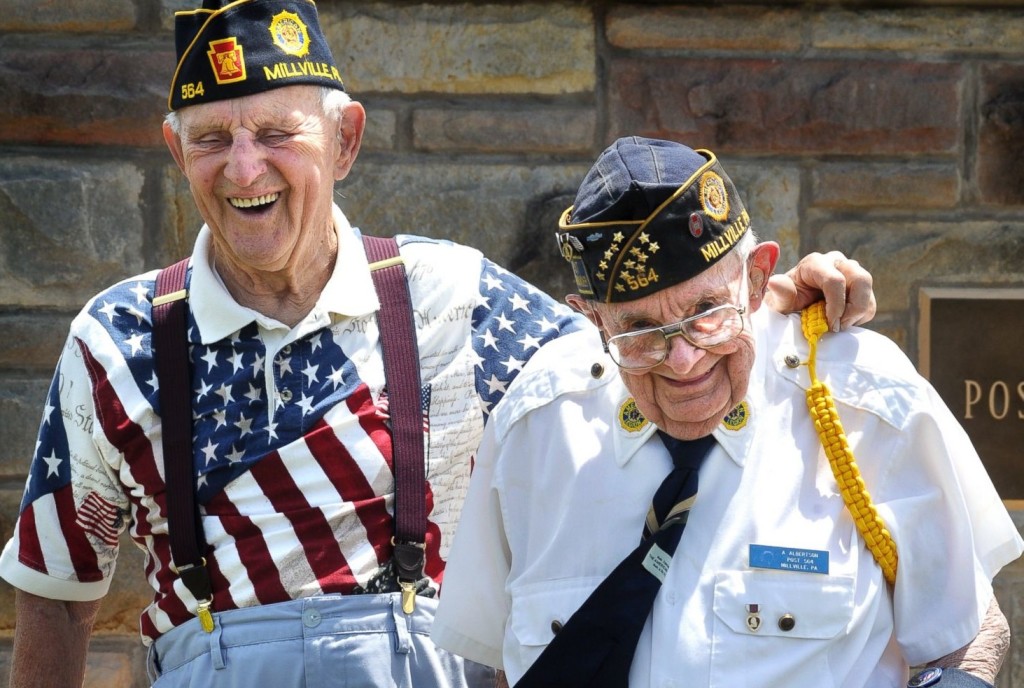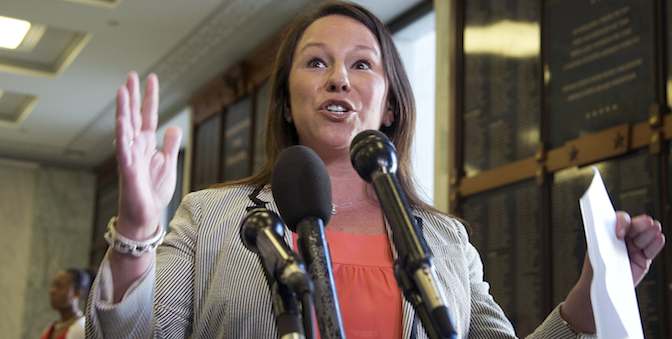Martha Roby: New commander at Fort Rucker

Fort Rucker this week will host a change of command ceremony, a time honored military tradition marking a transition of leadership. Major General William Gayler will officially assume command of the Army Aviation Center of Excellence at Fort Rucker taking the place of the departing commander, Maj. Gen. Michael Lundy. I want to thank Maj. Gen. Lundy for his exemplary leadership at Fort Rucker for the past two years. Fort Rucker is an important post, not just for the Wiregrass region and the State of Alabama, but for our nation and its defense. Every Army aviator is trained at Fort Rucker. Despite the changing landscape of the modern battlefield, Army aviation has remained an essential component of warfare, and Fort Rucker has dutifully delivered the best-trained aviators for assignments all over the world. Commanders like Maj. Gen. Lundy have an enormous responsibility of fulfilling that vital mission while dealing with any number of challenges. Maj. Gen. Lundy’s command of the Army Aviation Center of Excellence came during an especially difficult time, as budget cuts forced military leaders to make tough decisions. It was about this time last year when many feared steep reductions by the Army would significantly affect the post and the surrounding community. Thankfully, the Army’s force reduction had minimal impact on Fort Rucker, and particularly the aviation student load and flight training hours. I can tell you that having Maj. Gen. Lundy’s steady leadership during such moments of uncertainty has been invaluable. The Army has not yet announced Maj. Gen. Lundy’s next assignment. Wherever it is, that organization will be gaining an exceptional leader. Fort Rucker’s new commander, Maj. Gen. William Gayler is a Georgia native who most recently served as the Deputy Commanding General for the U.S. Army in Europe and Commander of U.S. Army NATO. Maj. Gen. Gayler is a Master Army Aviator and has a distinguished service career that includes deployments in Desert Storm, Bosnia conflict, Iraq and Afghanistan. He is also no stranger to Fort Rucker, having previously served in multiple assignments including Aide-de-Camp to the commanding general. On behalf of Alabama’s Second Congressional District, I am pleased to welcome Maj. Gen. Gayler back to our state and wish him the best as he begins his command of Fort Rucker. I look forward to working with him as I have past commanders in supporting the important mission at the Army Aviation Center of Excellence. It is my great honor to serve a district that is home to two of our nation’s finest military installations: Fort Rucker in the Wiregrass and Maxwell-Gunter Air Force Base in Montgomery. Supporting our military and serving veterans remain top priorities for me in Congress and some of the most rewarding parts of my job. • • • Martha Roby represents Alabama’s 2nd Congressional District. She lives in Montgomery, Alabama with her husband, Riley, and their two children.
Bradley Byrne: Coast Guard has proud history in southwest Alabama

The U.S. Coast Guard has long been a staple right here on Alabama’s Gulf Coast, but do you know how that came to be? Before we get to the Coast Guard’s impact on Southwest Alabama, let’s look briefly at the history of the Coast Guard. On Jan. 28, 1915, President Woodrow Wilson signed into law the “Act to Create the Coast Guard,” and with his signature, the Coast Guard we know today was formally born. The law President Wilson signed combined the Life-Saving Service with the Revenue Cutter Service to form what we consider the modern-day Coast Guard. In reality, the Coast Guard had been around for many years prior. The origins of the present-day Coast Guard can be traced back to Aug. 4, 1790, when President George Washington signed the Tariff Act to empower ten U.S. ships to enforce trade laws and reduce smuggling. The USCG is one of the oldest organizations of the federal government and was the only armed force patrolling the seas until the Navy Department was established in 1798. In 1967, the Coast Guard became a function of the Department of Transportation. The Coast Guard didn’t reach its current home until 2003 when it was placed under the newly created Department of Homeland Security. The Coast Guard has three primary responsibilities: maritime safety, maritime security, and maritime stewardship. These include operations such as search and rescue, law enforcement, ice operations, illegal fishing patrols, drug interdiction, and migrant interdiction. The Coast Guard obviously plays a key role in responding to natural disasters and keeping our waterways open. The Coast Guard is divided into nine separate districts, which are then divided into individual sectors. Southwest Alabama is located in District 8, and we are home to Sector Mobile. Sector Mobile is the Coast Guard command responsible for all maritime operations along 400 miles of the coastline ranging from Pearl River, Mississippi, to Econfina River, Florida. Carrying out these operations are Coast Guard men and women stationed in Mobile aboard the Cutters Saginaw, Barbara Mabrity, Cobia, and Stingray as well as Station Dauphin Island, which is located on the eastern tip of the island. Their efforts keep the citizens of southwest Alabama safe. Locally, the Coast Guard has played an important role with emergency search and rescue efforts during natural disasters. Most recently, the Coast Guard helped respond to the Dauphin Island Regatta tragedy. The Coast Guard is also remembered for their help responding to Hurricane Katrina and the BP oil spill. If you are like me, you probably see the bright orange helicopters flying over our area from time to time. Those Coast Guard helicopters have long been a fixture because Mobile is also home to the Coast Guard Aviation Training Center. I recently had an opportunity to visit the Aviation Training Center to learn more about the impressive work being done to train our Coast Guard aviators. The training includes written coursework, lectures, simulator training time, and then real-time training flights. Every Coast Guard aviator must go through initial training here in Mobile, but they also must return at least once a year for a proficiency course. That’s why so many of the Coast Guard aviators I have visited with over the years have very fond memories of southwest Alabama. We are so fortunate to have such a strong Coast Guard presence here in our own backyard. I will always stand up for the members of the Coast Guard and do everything I can to support the vital role they play in our national security and maritime safety operations. • • • Bradley Byrne is a member of the U.S. Congress representing Alabama’s 1st Congressional District.
Martha Roby: VA “Takeover” bill gets hearing

As someone who represents a district with a high concentration of veterans, an important part of my job in Congress is making sure national Department of Veterans Affairs leaders pay attention to Alabama and remain focused on improving the long-troubled Central Alabama Veterans Health Care System. We certainly got their attention last year. Working with courageous whistleblowers and the press, we were able to expose major instances of misconduct, negligence and cover-up that led to the director of the Central Alabama VA being the first manager terminated for cause under the new VA reform law. That was just over a year ago, and since then, our efforts to work with VA leaders to overhaul the system and improve access to care have been frustrating to say the least. Out of this frustration came an important lesson: we cannot depend on a broken bureaucracy to fix itself. I believe one major problem is that for a year we had been asking for VA leaders to intervene at this troubled system, rather than requiring them to. I believe it’s time to change that, which is why I filed legislation that would compel top VA officials to intervene and take over failing VA medical centers. It’s called the Failing VA Medical Center Recovery Act, and it offers the VA new tools to turn around the worst of our health care centers. Further, it puts responsibility for doing so squarely on the Secretary of Veterans Affairs. I recently presented my VA “takeover” bill before a hearing of the House Veterans Affairs Subcommittee on Health, where I discussed the legislation with fellow lawmakers, representatives from the VA and other interested groups. Not surprisingly, some entrenched in the system weren’t welcoming to a bill that disrupts the status quo. Still, I appreciate their willingness to engage, and I remain hopeful that they will embrace this legislation as a powerful new tool for improving veterans’ health care services. I am willing to work with anyone who truly wants to improve the VA through this proposal or others. But, let me tell you what I’m not willing to do: I’m not willing to let my bill become a victim of the VA’s culture of complacency. Minor tweaks here and there aren’t going to cut it. We need wholesale change, and the veterans I represent know it. I am cautiously optimistic about the future prospects for the Central Alabama VA. The numbers have been improving in recent months and a new, permanent director will soon be selected to bring needed stability. I’m working to bridge the gap between the VA and the local medical community to make sure we have a strong network of local providers where veterans can access care quickly and without driving long distances. I will keep you updated on this progress as we go. Martha Roby represents Alabama’s 2nd Congressional District. She is currently serving her third term.
Alabama delegation honors America’s veterans this Veterans Day

There are 19.3 million veterans living in the United States and 409,997 of them call Alabama home. Today, in honor of Veterans Day, members of the Alabama congressional delegation are paying tribute to their selfless service and sacrifices. Here’s what the Alabama delegation is saying in honor of Veterans Day: U.S. Sen. Richard Shelby: Today I proudly join my colleagues and Americans across the country in paying tribute to our nation’s veterans and their families. Without the selfless sacrifices of the courageous men and women in uniform, the freedoms we enjoy as Americans would not be possible. On Veterans Day and every day, we must remember that freedom comes at a great price, and that we owe our active duty and retired servicemen and women a debt of gratitude. Our veterans’ unwavering commitment to defending security and prosperity should never be forgotten. U.S. Rep. Bradley Byrne (AL-01): …So on this Veterans Day, and every day, may we never forget the courage, sacrifice, dedication, and unselfish nature of all those who have served our country. And to all our veterans and their families: on behalf of a grateful nation, thank you for your service and God bless the United States of America. Watch Rep. Byrne’s full statement below: U.S. Rep. Martha Roby (AL-02) via Facebook: Veterans Day is a time to pause and honor those who have served in uniform to protect this nation and the freedoms we enjoy. It is a special day when we make sure to say “thank you” to our friends, neighbors, family members – and those we’ve never even met – for their service to our country. …God bless you and thank you for your service. U.S. Rep. Robert Aderholt (AL-04) via Facebook: Thank you veterans for your service to our nation. U.S. Rep. Gary Palmer (AL-06): I want to wholeheartedly express my appreciation to each and every one of our veterans, both in Alabama and throughout America. Our national anthem calls the America the ‘land of the free and the home of the brave.’ A popular rephrasing of that is that America is ‘Land of the free because of the brave.’ It remains free because brave citizens choose to join our armed forced and serve their country sacrificially. U.S. Rep. Terri Sewell (AL-07): Today we salute the selfless sacrifices of our nation’s 21 million veterans. These patriots have kept our nation safe while defending our nation at home and abroad. They have served our country with distinction, and we should honor them for their bravery and courage with actions — not simply words. Congress must continue to support and provide critical resources to the Veterans Administration (VA) to ensure that our veterans have access to quality health care, good-paying jobs, affordable housing, and opportunities to continue their education. We should not deny the very liberties they fought to protect, nor deny them any benefits they so fittingly deserve. I am committed to ensuring that we honor the promises that were made to these American heroes. Today, we reaffirm our commitment to them and their families by vowing to make sure they succeed. They deserve nothing less.
For veterans, Birmingham ranked one of America’s worst cities

Veterans Day is just around the corner, where America will stop and salute all of those who have served proudly — our veterans. But pride and gratitude don’t change the facts on this national holiday. There are 19.3 million veterans living in the United States and close to 422,000 of them are struggling to find work. In honor of those who fought bravely in the name of American freedom, personal finance website WalletHub conducted an in-depth analysis of 2015’s Best & Worst Cities for Veterans in order to help veterans find the most livable cities to call home. According to their study, one Alabama city ranked as one of the worst large cities in the country for veterans to live in. Birmingham ranked 85 overall, making it the 15th worst city for veterans. WalletHub analysts compared 100 of the most populated U.S. cities across 18 key metrics — including the veteran unemployment rate, housing affordability, number of homeless veterans, educational opportunities, number of veteran benefits,the availability of Veterans Affairs health facilities — to determine their rankings. Source: WalletHub As for how neighboring cities fared, Birmingham came up short — Nashville ranked 62nd, New Orleans ranked 66th and Atlanta ranked 69th. Only Memphis came up worse, ranking an abysmal 93rd.
Mike Rogers: Honoring America’s veterans

Each year on Nov. 11, we honor those brave men and women who have served our country in uniform and those who have paid the ultimate sacrifice for the freedoms we enjoy today. As many of you across East Alabama may know, I have a Veterans Advisory Council that includes veterans from each of the 13 counties that make up the 3rd District. These council meetings allow me the opportunity to hear directly what is on the minds of our veterans and take their concerns back to Washington. This year our meeting is scheduled during the week of Veterans Day and will include a very special guest, Mr. Bennie Adkins of Opelika. Mr. Adkins was awarded the Medal of Honor in September 2014 for his acts of bravery on the battlefield in Vietnam. Mr. Adkins, like all of our veterans, is a true American hero and we look forward to having him at our meeting. During the past couple of years, scandals have occurred within our VA healthcare system, including the Central Alabama Veterans Healthcare System (CAVHS) in Montgomery. I think we all can agree our Veterans deserve the best care we can offer them. It is the least we can do to thank them for their selfless service. One of the changes implemented was the Veterans Choice Program that allows veterans to get health care from non-VA doctors. Unfortunately some of our veterans still haven’t been able to get the help they need. That is why I’ve joined U.S. Rep. Byrne in cosponsoring H.R. 1096, which would make the choice program work better by changing the criteria to closest medical service instead of medical facility. While this is just one fix to one issue it is an example of what we as a Congress have to continue to do to make sure we keep the the Department of Veterans Affairs accountable and responsive to the needs of our veterans. In addition, my office always stands ready to assist any veteran from the 3rd District when it comes to dealing with the VA. Not just on Veterans Day, but every day, I encourage all of us across East Alabama to remember the men and women in uniform that have lost their lives and to keep those still serving and their families in our thoughts and prayers. God Bless America. Mike Rogers represents Alabama’s 3rd Congressional District. He is in his third term.
Bradley Byrne: House acts to stop Iran deal

There is no greater responsibility of Congress than to ensure for the safety and security of the American people. With that in mind, last week I voted against the Iran nuclear agreement, which I believe puts the American people at greater risk. I’ve been opposed to the Iran nuclear talks from the start because I see no reason to believe Iran will keep its word. Iran’s supreme leader has been known to lead crowds in cheers of “death to America” and just last week their leader said Israel will no longer exist in 25 years. As the top state-sponsor of terrorism in the world, Iran has a track record of supporting terrorist groups like Hamas and Hezbollah. Reports indicate that Iran is directly responsible for the death of at least 1,000 American military members in the Middle East. These deaths come in the form of Iranian-backed fighters and Iranian bombs known as “explosively formed penetrators.” Iran clearly wants to bring harm to the American people, and this agreement will make it easier for them to do just that. Iran will be able to acquire new military technologies and weapons, including intercontinental ballistic missiles (ICBMs). Iran does not need ICBMs to hit targets in the Middle East, but they need ICBMs to hit long distance targets like the United States. I also opposed the deal because the American people have made clear they do not support it. In fact, a recent public poll by the Pew Research Center found that only 21% of Americans support the Iran deal. Even worse, just two percent of Americans have a “great deal of confidence” that Iran’s leaders will hold up their end of the agreement. Personally, I have heard from constituents about this issue everywhere I go. At every one of my 16 town hall meetings in August, someone asked me what Congress was going to do to stop the Iran deal. I even had a woman come up to me in the grocery store, with tears in her eyes, asking me to oppose the deal. It is clear my constituents in Southwest Alabama and people all across the country do not want to see this deal move forward. So last week the House used a three step strategy to try and stop the Iran nuclear agreement. First, we passed a “Sense of Congress” that President Obama broke the law by not sharing all the relevant materials related to the Iran deal. There are multiple reports that Iran agreed to a number of “side deals” that have not been made public. One of these deals outlines the process by which inspectors will be given access to Iran’s military bases. Second, the House passed a bill to prevent President Obama from lifting any of the sanctions on Iran. It is clear the economic sanctions were working because the Iranian economy was in shambles, and it would be a mistake to lift the sanctions and give Iran access to billions of dollars. Third, the House rejected the Iran nuclear deal on a straight up or down vote. The vote total was 162 in support of the deal to 269 opposed. There was bipartisan opposition to the agreement with 25 Democrats joining all Republicans to reject the deal. While the Senate has not been able to block the Iran deal yet, I remain committed to doing everything I can in the House to halt this flawed deal. If the deal does go into effect, I will join my colleagues in providing diligent oversight of the Obama administration to ensure Iran does not gain nuclear weapons. Bradley Byrne is a member of the U.S. Congress representing Alabama’s 1st Congressional District.
Terri Sewell visit Alabama troops in Iraq

Next week she heads back to Capitol Hill, this week Congresswoman Terri Sewell (AL-07), a second-term member of the House Permanent Select Committee on Intelligence, took time to meet with members of the Alabama National Guard’s 20th Special Forces unit, part of U.S. Special Operations Command that is currently deployed in the Kurdish Region of Northern Iraq, during a four-day trip to the country. There, Sewell received oversight briefings on the current U.S. Department of Defense training mission with Syrian fighters and the Iraqi Army. “Our brave men and women in uniform play an integral role in Iraq, and my visit to Ebril and Baghdad deepened my appreciation for the sacrifices they have made to protect our country,” Sewell said of the men and women she met on her trip. “I was especially honored to meet with members of the Alabama National Guard’s 20th Special Forces division, and to learn more about their vital mission in Iraq. I want to thank these remarkable Alabama National Guardsmen for their exemplary service to our nation during their deployment in Iraq. I am especially proud to acknowledge the critical role that Alabama troops are playing in the fight against global terrorism.” Sewell continued, “As a member of the House Intelligence Committee, one of my most sacred duties is to ensure that every vote I make supports and advances our national security. Freedom is not free, and members of the armed forces deserve special recognition for their service and sacrifice. We in Alabama are doing our part.” Congresswoman Terri Sewell with American leadership in Iraq, including General Mark Odom who is the Combined Joint Operations Center Commander in Northern Iraq.
Martha Roby: Strides taken at VA, but long road remains

This past week marked one year since the director of the Central Alabama Veterans Healthcare System (CAVHCS) was removed from his post when a pattern of gross mismanagement and systemic malfeasance was exposed. Weeks later he would become the first VA official in the country fired under our new VA accountability law. Deputy VA Secretary Sloan Gibson visited CAVHCS at my request for an update on progress made over the past year to improve what have been some of the worst VA medical centers in the country. I wanted him to see that, while some strides have been made to fix this broken system, major issues still remain. We had a productive meeting, and I appreciate how responsive Mr. Gibson and Southeast Regional Director Tom Smith have been to my concerns. One of the biggest contributors to the long wait times at CAVHCS has been the serious shortage of medical staff. There wasn’t a funding issue, but rather a management and human resources breakdown. Recently, steps have been taken to hire more doctors, nurses and medical support staff, which is certainly promising. But, as I told Mr. Gibson, we need that to start translating into better access to care. The fact is we still have more than 4,000 veteran patients who have waited longer than 90 days without an appointment. That’s unacceptable, and I’m going to keep pushing VA leaders to improve until we make this right. One issue we discussed at length was repairing CAVHCS’ relationships with local hospitals and other health providers. Why is that important? Well, the vast majority of that 4,000 number I mentioned comes from those who have been referred to outside physicians but are awaiting appointments. I believe the future of veterans health care will rely less on actual VA facilities and more on partnerships with outside medical providers for services. We have amazing doctors, hospitals and other providers in Alabama that are eager to play a larger role in caring for vets, and the money is there to do it. The problem is CAVHCS has had trouble in the past keeping up with payments on contracts, so many local providers are naturally hesitant. Mr. Gibson and Mr. Smith expressed great interest in working with me to bridge that gap and build a network within Alabama’s medical community that will improve access and enhance care for veterans. Above all, we badly need a permanent director at the Central Alabama VA who is both empowered and driven to make the necessary changes. After a year, it looks like we are close to having that person. I will keep you updated on these developments as we move forward. Martha Roby represents Alabama’s 2nd Congressional District. She is currently serving her third term.
Top secret Hillary Clinton emails include drone talk

The two emails on Hillary Rodham Clinton‘s private server that an auditor deemed “top secret” include a discussion of a news article detailing a U.S. drone operation and a separate conversation that could point back to highly classified material in an improper manner or merely reflect information collected independently, U.S. officials who have reviewed the correspondence told The Associated Press. The sourcing of the information in the emails could have significant political implications as the 2016 presidential campaign heats up. Clinton, the front-runner for the Democratic nomination, agreed this week to turn over to the FBI the private server she used as secretary of state, and Republicans in Congress have seized on the involvement of federal law enforcement as a sign that she was either negligent with the nation’s secrets or worse. On Monday, the inspector general for the 17 spy agencies that make up what is known as the intelligence community told Congress that two of 40 emails in a random sample of the 30,000 emails Clinton gave the State Department for review contained information deemed “Top Secret/Sensitive Compartmented Information,” one of the government’s highest levels of classification. The two emails were marked classified after consultations with the CIA, which is where the material originated, officials said. The officials who spoke to the AP on condition of anonymity work in intelligence and other agencies. They wouldn’t detail the contents of the emails because of ongoing questions about classification level. Clinton did not transmit the sensitive information herself, they said, and nothing in the emails she received makes clear reference to communications intercepts, confidential intelligence methods or any other form of sensitive sourcing. The drone exchange, the officials said, begins with a copy of a news article that discusses the CIA drone program that targets terrorists in Pakistan and elsewhere. While a secret program, it is well-known and often reported on. The copy makes reference to classified information, and a Clinton adviser follows up by dancing around a top secret in a way that could possibly be inferred as confirmation, they said. Several officials, however, described this claim as tenuous. But a second email reviewed by Charles McCullough, the intelligence community inspector general, appears more suspect. Nothing in the message is “lifted” from classified documents, the officials said, though they differed on where the information in it was sourced. Some said it improperly points back to highly classified material, while others countered that it was a classic case of what the government calls “parallel reporting” – different people knowing the same thing through different means. The emails came to light Tuesday after Sen. Chuck Grassley, R-Iowa, reported that McCullough found four “highly classified” emails on the unusual homebrew server that Clinton used while she was secretary of State. Two were sent back to the State Department for review, but Grassley said the other two were, in fact, classified at the closely guarded “Top Secret/SCI level.” In a four-page fact sheet that accompanied a letter to Clinton supporters, Clinton spokeswoman Jennifer Palmieri stressed that Clinton was permitted to use her own email account as a government employee and that the same process concerning classification reviews would still be taking place had she used the standard “state.gov” email account used by most department employees. The State Department, meanwhile, stressed that it wasn’t clear if the material at issue ought to be considered classified at all. Still, the developments suggested that the security of Clinton’s email setup and how she guarded the nation’s secrets will remain relevant campaign topics. Even if the emails highlighted by the intelligence community prove innocuous, she will still face questions about whether she set up the private server with the aim of avoiding scrutiny, whether emails she deleted because she said they were personal were actually work-related, and whether she appropriately shielded such emails from possible foreign spies and hackers. Clinton says she exchanged about 60,000 emails in her four years as secretary of state. She turned over all but what she said were personal emails late last year. The department has been making those public as they are reviewed and scrubbed of any sensitive data. The State Department advised employees not to use personal email accounts for work, but it wasn’t prohibited. But Clinton’s senior advisers at the State Department would have been briefed upon basic protocol for handling classified information and retaining government records. In Clinton’s time, most officials saved their emails onto a separate file or printed them out when leaving office. Only recently has the department begun automatically archiving the records of dozens of senior officials, including Secretary of State John Kerry. In the emails, Clinton’s advisers appear cognizant of secrecy protections. In a series of August 2009 emails, Clinton aide Huma Abedin told Clinton that the U.S. point-man for Afghanistan, Richard Holbrooke, and another official wanted “to do a secure” conversation to discuss Afghan elections. Clinton said she could talk after she received a fax of a classified Holbrooke memo, also on a secure line. Later, Abedin wrote: “He can talk now. We can send secure fax now. And then connect call.” But other times, the line was blurred. Among Clinton’s exchanges now censored as classified by the State Department was a brief exchange in October 2009 with Jeffrey Feltman, then the top U.S. diplomat for the Middle East. Both Clinton and Feltman’s emails about an “Egyptian proposal” for a reconciliation ceremony with Hamas are marked B-1.4, classified for national security reasons, and completely blacked out from the email release. A longer email the same day from Clinton to former Sen. George Mitchell, then Mideast peace envoy, is also censored. Mitchell responds tersely and carefully that “the Egyptian document has been received and is being translated. We’ll review it tonight and tomorrow morning, will consult with the Pals (Palestinians) through our Consul General, and then I’ll talk with Gen. S again. We’ll keep you advised.” Republished with permission of the Associated Press.
Martha Roby: Breaking the bureaucracy

This week the U.S. House passed H.R. 1994, the VA Accountability Act, to empower the Secretary of Veterans Affairs with the legal authority to swiftly remove problem employees at all levels. You may recall that Congress passed a bill last year similarly empowering the Secretary to remove bad actors, but that legislation only authorized him to fire senior officials. Under this law, the former Central Alabama Veterans Health Care System (CAVHCS) director became the first official terminated, but as I said at the time, blame for all of the misconduct and mismanagement did not rest with one person alone. This bill is important in solving some of the broader problems the VA has had with accountability nationwide. However, more acute problems still exist at particularly troubled VA facilities that I believe require more specific action. While the director in Central Alabama was rightly removed this past August, the system has continued to struggle. Recently, VA medical centers in Montgomery and Tuskegee were identified as worst and second worst, respectively, in the nation for delays in patient appointment completions. Communication and coordination between various levels of management are still badly out of sync at a time when we can least afford it. And, VA leadership continues to point to the various layers of bureaucracy for why problems persist. That’s why this week I introduced legislation that would break through the bureaucracy and require top VA leaders to come in and take over failing systems, like Central Alabama. My bill, H.R. 3234, the Failing VA Medical Center Recovery Act, compels top VA leadership to send a “rapid response team” to take over our worst facilities and turn them around. This is the anti-bureaucracy. This is the team no complacent VA employee wants to see coming because they know the status quo is about to get shaken up. Much like the threat of a “takeover” of a failing school by the state superintendent, this puts VA medical centers on notice that we will no longer tolerate their incompetence on behalf of our veterans. Under my bill, determination of a failing facility would be based strictly on data — not media coverage or the opinion of the Secretary. And, the takeover trigger would be automatic, not optional or based on the whims of Washington. The House was right to empower the VA Secretary with the authority to enforce greater accountability. Now, we need to require him to use it to intervene at our worst performing facilities. That’s what the Failing VA Medical Center Recovery Act does, and I look forward to working with my colleagues on both sides of the aisle to advance this legislation in the coming weeks and months. Martha Roby represents Alabama’s 2nd Congressional District. She is in her third term.
Martha Roby, “tired of asking” for veteran care reform, calls for VA “takeover” of failing medical centers

On Tuesday, U.S. Rep. Martha Roby introduced a bill that would force the federal Veterans’ Administration to do something she has asked them to do for a long time: intervene when regional medical centers show they are unable to adequately care for American military veterans. Roby’s new proposal — H.R. 3234, dubbed the “Failing VA Medical Center Recovery Act” — calls for a “rapid response team of managers and medical professionals” to deploy to failing centers directly. “I believe the problem is we have been depending on a broken bureaucracy to fix itself,” said Roby in a prepared statement Monday. “I believe it’s time to change that by breaking through the bureaucracy to get results on behalf of our veterans.” “This is the ‘anti-bureaucracy.’ This is the team no complacent VA employee wants to see coming because they know that the status quo is about to get shaken up.” Roby represents Alabama’s 2nd Congressional District, where the state’s VA medical centers in Montgomery and Tuskegee have been identified as the nation’s worst and second worst, respectively. The third-term Republican said she will not allow inefficiencies in the “sprawling VA bureaucracy” that provides poor service to veterans stand any longer. “The determination of a failing medical center will be based on data, not the Secretary’s whim or what media attention it is garnering,” Roby said Monday. “My bill sets up an automatic trigger that compels the VA to act under the law. “I’m glad the [Veterans’ Affairs] Secretary [Robert McDonald] used his authority to take control of the situation in Phoenix. But, why not Montgomery? Why not Tuskegee? Why not come and take control of the worst and second worst situation in the country, especially after we have repeatedly asked and pleaded him to do so? “I’m tired of asking, and that’s why my bill requires the VA to step in and take charge.” See Roby’s House floor speech where she formally introduced the bill below.


